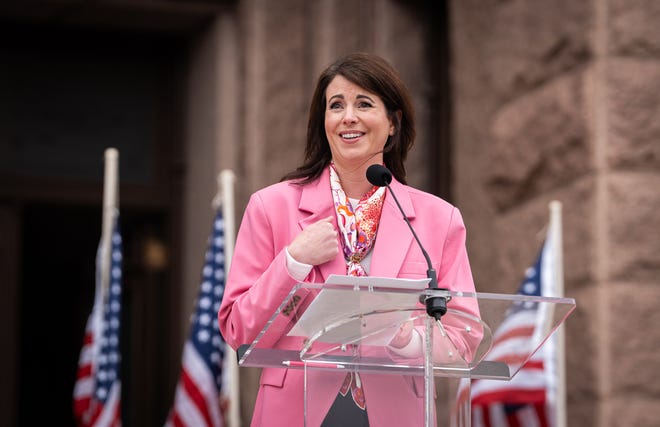
Modeled by a national and statewide trend to lessen instances of bullying and keep students focused in schools, an Austin-area legislator is seeking to ban cellphones in Texas classrooms.
Texas House Bill 515 by Rep. Ellen Troxclair, R-Marble Falls, would require Texas school districts to adopt a policy prohibiting students from using their personal electronic devices during the day and have them place their cellphones in a lockable container or specified location.
Amid myriad concerns such as bullying, student focus and teachers’ ability to manage a classroom, there has been a recent uptick in legislation similar to Troxclair’s filed across the country, a move that has largely been praised by mental health researchers but has left some parents worried about not having easy access to their children during the school day, especially during emergencies.
Troxclair’s main drive to file the bill was the harmful mental health effects of social media and students’ ability to access that content during the school day, she said. Social media use contributes to bullying issues, she said.
“It is no surprise that our kids are facing a mental health crisis, and we’ve seen that play out a lot of different ways,” Troxclair said. “It’s very clear now with the data that we have that a big driver of the increase in suicide and mental health is because of social media.”
Troxclair also pointed to research that indicates cellphones distract students from focusing on academics during the school day.
“It’s impossible for a teacher to compete with an addictive device that’s in kids’ pockets,” Troxclair said.
The bill would require schools to make a district-provided phone accessible to students during the day to contact parents if needed, and it would allow students who need to use a personal device because of a medical condition to have access to their personal phone if they provide a doctor’s note.
HB 515 also directs the Texas Education Agency to create an annual report about the policy’s effectiveness.
A parent who needs to reach their child during the day can call their school’s front office, Troxclair said, adding that for parents who are concerned about not being able to communicate with their children during emergencies, her recommendation would be to have students listen to teachers and law enforcement officers during such incidents, she said.
“In the case of an emergency, you want kids listening to instructions,” Troxclair said. “We’ve seen situations in the past where we’ve seen those things hampered by kids being on their phones.”
Students have turned to their phones to communicate with parents and emergency responders in school emergencies. During the May 24, 2022, mass shooting at Uvalde’s Robb Elementary School, children called 911 multiple times from inside their classroom as they waited 77 minutes for law enforcement officers to confront the shooter. Two teachers and 19 children were killed in the shooting.
But the Uvalde school shooting is unique because of multiple systemic failures, Troxclair said. There are other things that the Legislature has and should do to protect students in schools, such as requiring secure infrastructure to protect student safety, she said.
‘Failure’:DOJ’s scathing Uvalde school shooting report criticizes law enforcement response
Troxclair told the American-Statesman that she hopes to allocate money from the state’s school safety funding to cover any costs districts might incur as a result of her proposed cellphone ban, she said.
Multiple Texas school districts have already taken up similar bans on their own.
Lake Travis enacted a cellphone ban at the middle and elementary level this year, and its School Health Advisory Committee at a meeting last month noted that members would like to discuss a possible ban at the high school.
Eight states have bans or restrictions on cellphone use in schools either in effect or slated to go into effect within the next 18 months, including California, Florida, Indiana and Virginia, according to KFF, formerly the Kaiser Family Foundation, a San Francisco-based health policy research nonprofit. Another eight states issued guidance or policy recommendations from state-level education departments recommending or piloting programs with the goal of restricting cellphone use, KFF reported.
Texas isn’t alone in its proposed legislation this session.
Fourteen other states have introduced similar legislation to Troxclair’s HB 515, according to KFF’s analysis.
An October Pew Research Center poll found that while 68% of surveyed adults support a ban on cellphones during class, only 36% support a ban during the entire school day.
The data don’t vary much whether or not an adult is a parent of a K-12 child, but it varies drastically by age groups.
Only 45% of adults 18-29 years old support a ban on cellphones in class, compared with 80% of adults who are 50 or older, according to the data. Only 18% of 18- to 29-year-olds support a ban during the entire school day, compared with 44% of people 50 or older.
发表回复